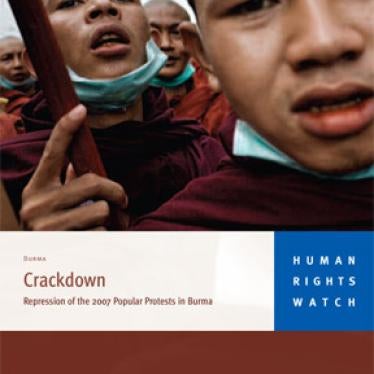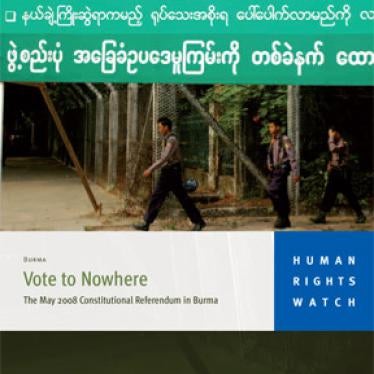(New York) - Twenty years after the uprising in Burma, the military government continues to sharply restrict fundamental rights and violently suppress dissent, Human Rights Watch said today. The anniversary falls as the Olympic Games open in Beijing, while the Chinese government gives crucial support to Burma’s repressive regime.
On August 8, 1988, millions of Burmese took to the streets around the country to demand democracy and an end to military rule. The day was a turning point for the nationwide popular movement that had started in March 1988, because the Burmese army came out to brutally suppress the demonstrations, gunning down hundreds of protesters. An estimated 3,000 people were killed nationwide during the seven months of protests. There has been no independent investigation or prosecution of the members of Burma’s security forces involved in the violence of 1988. Many of Burma’s current leaders, such as President Than Shwe and army chief General Maung Aye, held senior positions in the military at the time.
“As the world celebrates the opening of the Beijing Olympics, people should pause to remember the atrocities in Burma 20 years ago,” said Elaine Pearson, deputy Asia director at Human Rights Watch. “This anniversary is testament to the Burmese people’s enduring demand for freedom and to the world’s failure to end repressive military rule. And China, more than any other country, has enabled the survival of the brutal Burmese regime.”
In echoes of the 1988 uprising, security forces brutally suppressed peaceful demonstrations of activists, monks and ordinary people in August and September 2007. Security forces shot and killed at least 30 protesters, and arrested thousands, many of whom were tortured and mistreated. The army continues to engage in brutal military offensives against ethnic minority populations in Burma, committing atrocities that violate international humanitarian law.
A third of Burma’s population of 54 million lives in abject poverty. Education and health services have deteriorated to among the lowest in the world. Following the devastating Cyclone Nargis, which struck southern Burma in early May 2008, the military government showed it was more concerned with national security than with the plight of its people. It initially delayed and blocked international relief efforts, and then proceeded with a constitutional referendum. Human Rights Watch’s report “Vote to Nowhere: The May 2008 Constitutional Referendum in Burma,” showed that the referendum was carried out in an environment of severe restrictions on access to information, repressive media laws, an almost total ban on freedom of expression, assembly, and association, and the continuing widespread detention of political activists. Despite obvious flaws in the process and its implementation, China hailed the referendum as progress. The ruling State Peace and Development Council (SPDC) has announced parliamentary elections for 2010.
Human Rights Watch said that the Olympic spotlight should be turned on Burma because of China’s role as a close ally of the SPDC. As a major source of foreign investment, trading partner, and diplomatic supporter of the SPDC, the Chinese government further entrenches military rule in Burma. China’s actions, such as blocking UN Security Council action on Burma, have frustrated efforts by the Burmese people to enlist other countries and the United Nations to press for an end to decades of political oppression.
On August 8, many heads of state, including US President George W. Bush, French President Nicolas Sarkozy, Chinese President Hu Jintao, Australian Prime Minister Kevin Rudd and Burmese Prime Minister Thein Sein will be in Beijing for the opening ceremony of the Olympic Games.
“The Chinese government and the Olympic movement should be ashamed to have a leader from this ruthless regime as an Olympic guest,” said Pearson. “At the very least, Beijing should tell the prime minister that it’s time for political reform in Burma. As a responsible power, China should put the Burmese people’s welfare first, ahead of profit from business deals and arms sales that only benefit the regime.”
This week, the new UN special rapporteur for human rights in Burma, Tomás Ojea Quintana, visited Burma for the first time. The UN special advisor to the secretary-general on Burma, Ibrahim Gambari, will also visit Burma in August to consult with the SPDC on political reforms.
Human Rights Watch calls on the international community, particularly China, India, and the members of the Association of Southeast Asian Nations (ASEAN) to pressure the Burmese government to cooperate fully with both envoys and to make basic reforms to improve the human rights situation, including to:
- Cooperate fully with the United Nations and international relief agencies to respond to cyclone-affected areas, to provide aid with full transparency, accountability, and community participation;
- Immediately and unconditionally release an estimated 2,000 political prisoners, including Nobel Peace Prize winner Aung San Suu Kyi, and permit them free and unfettered participation in political activities;
- Cease restrictions on the rights to freedom of expression, assembly, and association; and
- Cease military attacks against ethnic minority populations, and hold accountable all members of the security forces responsible for war crimes.
“Burma’s rulers have used China’s support as a license to commit atrocities,” Pearson said. “Concerned governments should focus sustained criticism and targeted sanctions on the military regime so that the people of Burma do not endure another 20 years of brutal oppression.”








